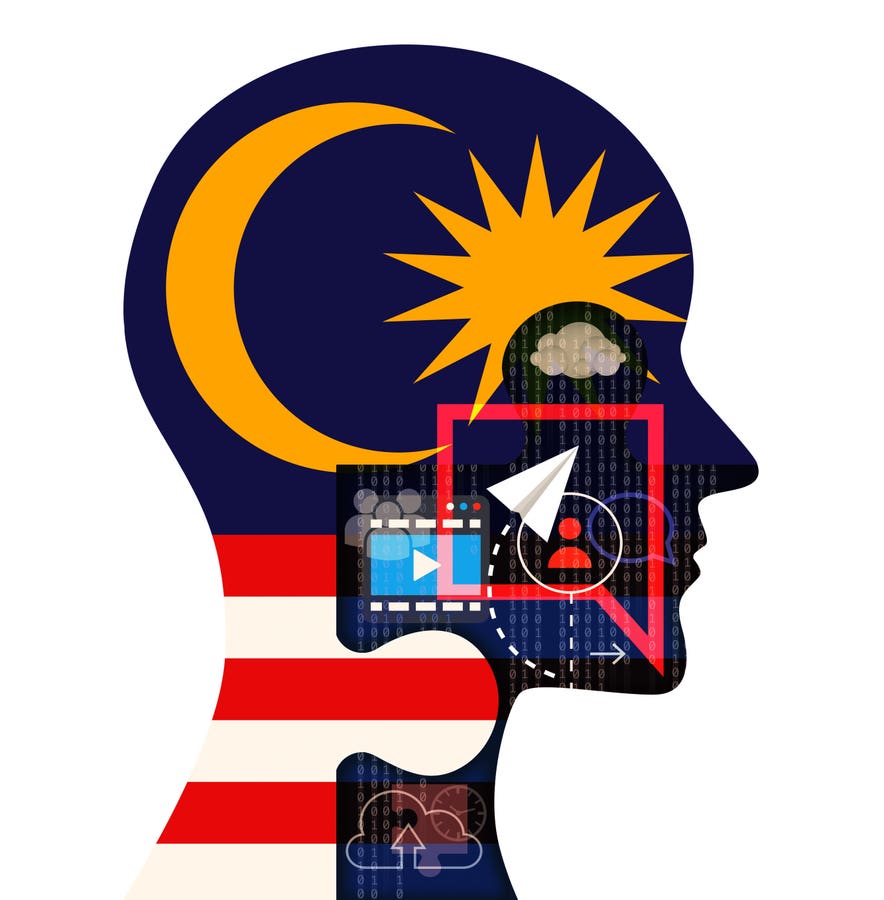Social media head with Malaysian national flag illustration on white background
getty
Malaysia marks its 68th Merdeka this August with a question that would have puzzled the architects of 1957: what does independence mean when intelligence itself becomes collaborative? The flags flutter with familiar fervor, but beneath the ceremony lies a more complex reality — the emergence of what might be called hybrid independence, where natural and artificial intelligences merge in pursuit of outcomes neither could achieve alone.
The timing is instructive. As 2025 unfolds, Malaysia finds itself testing a hypothesis that most nations have yet to articulate: that the next stage of development requires systems that weave all our assets, natural and artificial, together; guided by a commitment to values. This is neither the relentless futurism of Silicon Valley, nor the rigid planning of authoritarian tech states, or even the consumer-oriented track of the EU. It is something more inspiring, more pragmatic and maybe the most durable of all approaches. The current direction might be setting the stage to a fourth path – through the door of prosocial AI.
The Quadruple Logic Of Prosocial AI
If the commitment to an AI-Nation that is led by values is indeed taken from promise to practice then Malaysia’s approach to artificial intelligence development will demonstrate a simple but radical premise: sustainable systems simultaneously serve people, planet, profit and potential. This quadruple bottom line — the minimum viable complexity for regenerative development — distinguishes prosocial AI from its more narrowly focused predecessors, which are still the central ambition of most countries.
Traditional AI development optimizes for singular objectives: maximize engagement, minimize cost, increase speed, reduce error. Prosocial AI systems, by contrast, are designed to balance multiple objectives simultaneously. They must be economically viable (pro-profit), socially beneficial (pro-people), ecologically regenerative (pro-planet) and developmentally enhancing (pro-potential). This constraint forces a different kind of innovation — one that mirrors the complex trade-offs that characterize all biological systems.
Malaysia’s values-led approach to AI governance, embedded within the MADANI framework, provides the institutional foundation for this quadruple optimization. The nation has chosen to treat artificial intelligence not as a tool for maximizing any single metric, but as a medium for exploring Pareto improvements — changes that make some parties better off without making others worse off.
Hybrid Intelligence As Regenerative Practice
The concept of regenerative intent to AI emerges from the recognition that current technological development patterns are fundamentally extractive. They extract human attention, natural resources, social capital and cognitive capacity faster than these can be replenished. Regenerative AI, by contrast, is designed to enhance the capacity of the systems it touches.
In biological terms, regenerative systems increase the health and resilience of their environment over time. A healthy forest doesn’t just sustain itself — it improves soil quality, moderates local climate and supports increasing biodiversity. Similarly, regenerative AI systems should leave their users, communities and ecosystems more capable than they found them.
In a world where humans and machines coexist, this requires hybrid intelligence — the complementarity of natural and artificial intelligences, which is conditioned by double literacy – a holistic understanding of self and society, people and planet, combined with the candid comprehension of AI. Malaysia’s multicultural society and rich biodiversity provide a treasure-chest of entry points for this integration. The nation’s experience managing diversity through dialogue rather than dominance offers insights that pure technological approaches cannot replicate.
ASEAN’s Quiet Experiment In Technological Sovereignty
Within Southeast Asia’s diversified digital landscape, Malaysia’s approach could represent a form of technological sovereignty that differs markedly from the narrow choices that dominate global discourse. Rather than choosing between market dominance and the social good, Malaysia might be on a path to developing AI systems that are deliberately designed to address the ABCD of underappreciated AI issues : agency decay, bond erosion, climate conundrum and social division. It is a logic that is bound to build social cohesion and planetary health.
The ASEAN Guide on AI Governance and Ethics, launched in early 2024, established regional frameworks that prioritize transparency, fairness, accountability and human-centricity. Paired with regenerative intent Malaysia’s implementation of these principles could offer empirical evidence for whether values-based technology governance can compete economically with purely market-driven approaches. It could prove in practice that a shift from the lopsided scope of a return on investment, to a holistic view of return on values pays off.
It would be a bold and courageous choice. As digital technologies reshape global power structures, the viability of prosocial AI will determine whether smaller nations can maintain technological sovereignty or must choose between competing digital empires.
The Biodiversity Advantage In Cognitive Systems
Malaysia’s status as one of the world’s 17 megadiverse countries creates unique opportunities for developing regenerative AI systems. Biological diversity provides templates for cognitive diversity — patterns of information processing that artificial systems might learn from rather than ignore.
Consider how mycorrhizal networks in Malaysian forests manage resource distribution through chemical signaling that optimizes collective rather than individual success. These biological algorithms suggest design principles for AI systems that could optimize for collective wellbeing without sacrificing individual agency.
The practical applications are immediate. AI systems that help farmers optimize crop yields while improving soil health. Urban planning algorithms that design cities as metabolic systems rather than mechanical ones. Educational technologies that adapt to different learning styles without standardizing outcomes.
This biomimetic approach to AI development would position Malaysia to export not just technological products, but technological philosophies — ways of thinking about intelligence that emerge from ecological rather than industrial metaphors.
Measuring Success In Multiple Dimensions
A transition to hybrid independence requires new metrics. Traditional economic indicators measure flows — GDP, productivity growth, innovation rates. Regenerative systems require stock measures as well — social capital, ecological health, cognitive capacity, institutional resilience.
ProSocial initiatives can demonstrate success across all four dimensions of the quadruple bottom line. Economic returns that are sustainable, not extractive. Social benefits that strengthen communities rather than fracture them. Environmental impacts that are regenerative rather than degenerative. Human development that builds rather than boycotts human capabilities.
This is a measurement challenge that is not merely technical but conceptual. It requires developing indicators that capture the complex interactions between natural and artificial intelligence systems, between economic and ecological value, between individual advancement and collective wellbeing.
Practical Implementation: The M.E.R.D.E.K.A. Framework
The acronym MERDEKA itself provides a practical framework for implementing hybrid independence across the four dimensions of human existence — aspirations, emotions, thoughts and sensations — while addressing both social and ecological concerns:
Mastery Through Partnership – AI systems that enhance human competence rather than replace it, fostering collaborative relationships between human judgment and machine calculation that improve outcomes for both.
Empathy at Scale – Technologies that help individuals understand and respond to the needs of others across cultural and linguistic boundaries, transforming Malaysia’s diversity into a source of collective intelligence.
Reasoning Systems – Hybrid intelligence networks that combine human intuition with machine analysis to solve complex problems spanning multiple scales and timelines, from local community needs to global environmental challenges.
Direct Experience – Sensing technologies that connect humans more intimately with their local ecosystems, making ecological health visible and actionable in daily decision-making.
Economic Regeneration – Business models and algorithms designed to generate rather than extract value, creating positive-sum games where economic success strengthens rather than depletes social and natural capital.
Knowledge Commons – Information systems that treat knowledge as a shared resource rather than private property, ensuring that AI development benefits entire communities rather than concentrating power.
Adaptive Governance – Political technologies that enable more responsive and participatory decision-making, using AI to facilitate rather than replace democratic processes.
The Pragmatic Path Forward
Malaysia stands at a decision point that could define its next chapter of development. The opportunity for hybrid independence through prosocial AI remains largely untapped — a door waiting to be opened rather than a path already traveled. Success would require demonstrating that prosocial AI can compete economically with extractive alternatives, demanding patient capital, long-term thinking and institutional designs that reward collaboration over competition.
The potential represents a fundamentally different relationship between technology and society — one where artificial intelligence could serve as a medium for cultural expression rather than cultural homogenization. Where machine learning might enhance rather than replace human learning. Where digital systems strengthen rather than substitute for social systems.
Once Malaysia’s 68th Merdeka celebrations conclude and the flags are folded away, the real reason for celebration emerges. Hybrid independence is not a destination but a practice; a daily choice to design systems that serve multiple stakeholders across multiple timescales. The technology exists. The frameworks are in place. The question is whether Malaysia will choose the harder path that leads to regenerative outcomes, or the easier one that leads to extractive growth.
In a world increasingly divided between different visions of artificial intelligence, Malaysia’s potential for hybrid independence could become the most important technology story of the decade. If the nation chooses to walk through the door it has opened.
Selamat Hari Merdeka to a Malaysia exploring what independence means when intelligence itself becomes collaborative.









